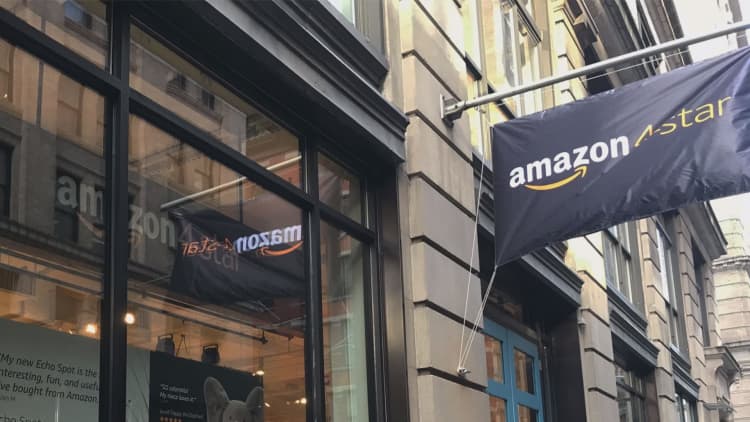In newly released answers to a House panel investigating four Big Tech firms, Amazon maintained it does not use data from individual third-party sellers to come up with its own products. But it does use "aggregated data" to inform its private label brands, the company said.
Amazon's use of private data to shape and promote its own branded goods seems to be a key question for lawmakers and regulators probing the company's competitive practices. If investigators believe Amazon holds a dominant marketplace position, they could seek evidence that would point to the company using its dominance to compete against third-party sellers that also rely on Amazon's platform for their livelihood. Bloomberg reported in September that the Federal Trade Commission has been interviewing sellers on Amazon's marketplace over antitrust concerns.
Private label products are created by Amazon or partners and are sold only on Amazon's website under an exclusive brand name. They benefit Amazon in many ways: They expand the selection of products on the site, offer better profit margins than selling third-party products, make supply-chain management easier and can help Amazon persuade big brands to cut prices to remain competitive on its site.
Amazon has been ramping up the number of private label brands it sells during the last three years, stoking fear and concern among some sellers and brands that sell competing products on the marketplace. The company says it now offers roughly 158,000 private brand products, plus additional variations on those products.
"Just like other stores, Amazon uses public and aggregated data from its stores to identify categories and products with high customer demand over a given time period," Amazon wrote in its response, defining aggregated data as "data that is aggregated across all third party sellers and Amazon's first-party sales and is therefore not specific to an individual seller. It includes data such as aggregate sales reports at a product category level."
The company also said it offers "free, anonymized shopping behavior analytics reports" that sellers can use to help figure out what other products customers looked at and what they searched for.
An Amazon spokesperson declined to comment.
The issue came up in a July hearing
The question of how Amazon uses shopping data in creating its own products had been the source of a heated exchange between Amazon's associate general counsel Nate Sutton and House Antitrust Subcommittee Chairman David Cicilline, D-R.I., at a hearing in July.
"You're telling us, sir, under oath, Amazon does not use any of that data collected with respect to what is selling, where it's selling, what products, to inform the decisions you make or to change algorithms to direct people to Amazon products and prioritize Amazon and deprioritize competitors?" Cicilline asked at the hearing.
"The algorithms are optimized to predict what customers want to buy regardless of the seller," Sutton said at the time. "We provide this same criteria, and with respect to popularity, that's public data. On each product page we provide the ranking of each product."
Amazon maintains this position in its written answer to Cicilline's question for the record, but also acknowledges its use of aggregated data for private label brands. The question was one of 158 Cicilline submitted to Amazon following the hearing and is part of a 69-page response, including appendices.
Amazon has also separately responded to an inquiry from the committee along with Facebook, Google and Apple, collectively turning over tens of thousands of documents, Cicilline previously told reporters.
The company also responded to Cicilline's questions for the record about the factors it considers for its algorithm in ranking its own private label products. Amazon denied that its algorithm takes into account "[w]hether a product is private label sold by Amazon." It also said its algorithm does not factor in whether a merchant is part of the company's Fulfillment-by-Amazon program or if they have purchased ads on Amazon.
But Amazon said its algorithm does consider factors like how closely a product's title matches a query, how frequently an item was purchased as well as price and availability. In response to a different question, Amazon said it knows that its "private brand products have on average higher customer review ratings, lower return rates, and higher repeat purchase rates than other comparable brands in the Amazon store," some of which are factors its algorithm would consider.
WATCH: Here's a look inside Amazon's store that only sells its most popular products



